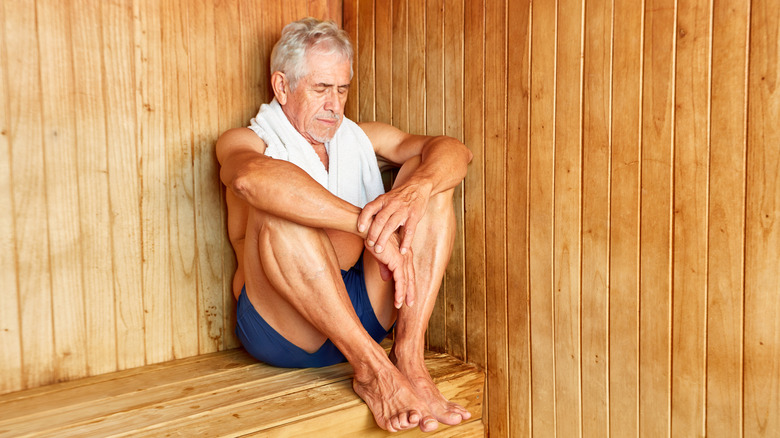Science Says This Steamy Activity Will Strengthen Your Heart And Help You Sleep
Sexual intercourse or a vigorous workout aren't the only steamy activities that may strengthen our heart and provide us with a better night's rest (via Johns Hopkins Medicine). Sauna bathing has also been shown to potentially enhance sleep, and reduce one's risk for cardiometabolic diseases (CMD), according to a 2021 scientific review published in the International Journal of Environmental Research and Public Health. Whether it's a one-off weekend retreat to the spa, or a health practice you implement weekly, here's how sauna bathing may affect our heart health as well as our quality of sleep.
Although there are different kinds of saunas, they generally fall into one of two categories. Dry saunas are electrically heated to a temperature of approximately 160 to 200 degrees Fahrenheit, with only 10% to 20% humidity. On the other hand, wet saunas usually run at lower temps, between 110 and 120 degrees Fahrenheit. But, they have much more humidity, usually at a level around 50%. It's important to note that experts caution against setting the temperature too high as it could increase the health risks of sitting in a sauna.
How sauna bathing may boost cardiovascular health
If you're wondering if saunas are safe for your heart, know that they aren't thought to be harmful for the average healthy person, or even for patients with stable heart disease or mild heart failure (via Harvard Health Publishing). As outlined in the 2021 scientific review, sauna bathing has been linked with decreases in blood pressure, and positive effects on arterial stiffness, in which an artery struggles to expand and contract as it should during pressure fluctuations. It doesn't take long for these effects to kick in, either; with improvements in cardiovascular functioning seen after just one sauna session.
Furthermore, researchers from a 2018 scientific review published in Evidence-Based Complementary and Alternative Medicine highlight one small study in which infants who had holes in their heart, and related congestive heart failure, experienced decreases in abnormal heart blood flow after 5 minutes of daily sauna exposure for four weeks. The majority of infants did not end up needing surgery. Findings of another study highlighted in the review involving more than 2,000 Finnish men showed that over the course of approximately 20 years, men who frequently used a sauna were 63% less susceptible to sudden cardiac death. All that being said, saunas are not advised for people with angina, untreated high blood pressure, low blood pressure, or serious heart conditions.
How saunas can help you get to sleep faster
Not only may saunas benefit our physical health, but they can also support our mental health, which in turn may lead to better sleep. Researchers from the 2018 scientific review point out how sauna bathing promotes stress relief, induces relaxation, enables mindfulness, and releases endorphins — sometimes called "happy hormones." This may partially explain why sauna bathing has been linked with sleep improvements.
But getting a soothing break from a busy day isn't the only reason why sauna bathing may benefit our sleep. "Heat will raise our body temperature when in a sauna," sleep expert Dr. Whitney Roban told Oura. "Afterwards, our body temperature will cool and drop, which then signals to the body to produce the hormone melatonin."
Playing an important role in our natural sleep-wake cycle, the boost in melatonin we get after sitting in a sauna may allow us to drift off to sleep in less time, and wake up feeling thoroughly rested and rejuvenated. The timing of your sauna session may also have health benefits to offer. To learn more, here's why you should consider sitting in a sauna following a workout as well.



